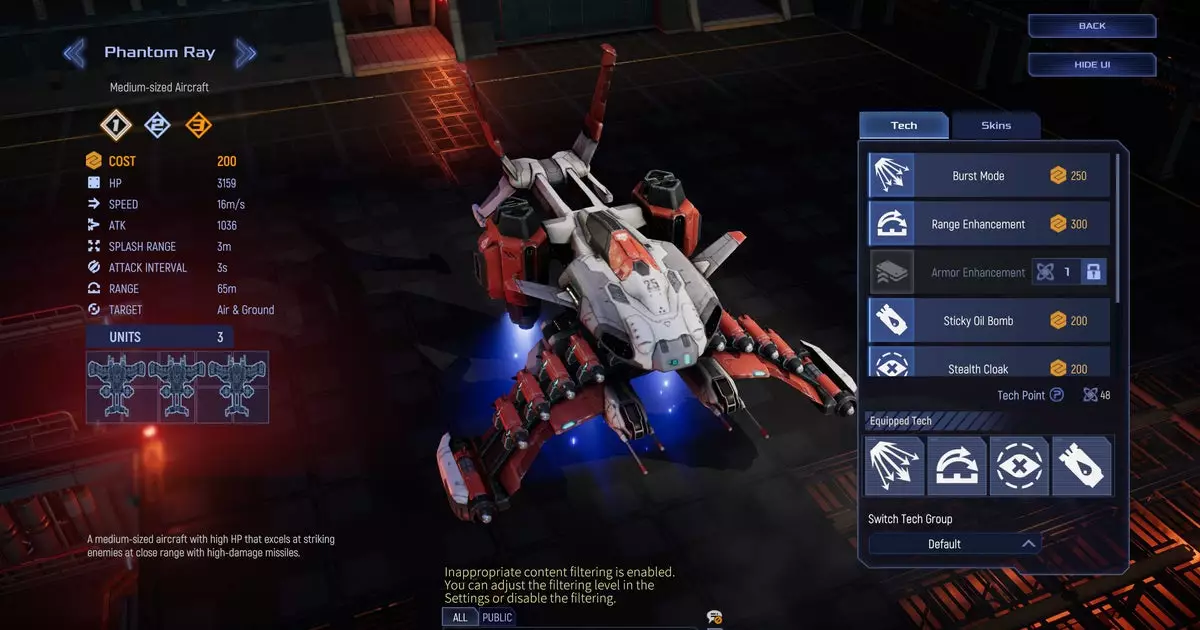As an avid player of Mechabellum since its early days, it’s hard not to feel a sense of intrigue and anticipation amidst its recent fluctuations and updates. The developers at Game River have consistently reinvented and refreshed the game experience, most recently with the advent of Update 1.1. This update introduces new units while simultaneously tweaking existing gameplay mechanics, thus complicating our once-familiar strategies and stirring excitement within the gaming community.
Among the most significant changes is the introduction of the Phantom Ray—a medium-sized aircraft that boasts both high hit points (HP) and devastating close-range missile capabilities. At a cost of 50 coins to unlock and 200 to field, players can deploy three units at once. The Phantom Ray’s stealth buff, which cloaks the unit until it engages in combat, adds a strategic layer that encourages careful positioning and tactical ambushes against unsuspecting foes. This mechanic alone has the potential to drastically shift the metagame, forcing players to re-evaluate their approaches to unit deployment and the use of scouting.
While the promise of a 40% damage bonus upon attack sounds formidable, it really hinges on skillful execution in a rapidly changing battlefield. Players must not only master the new unit but also anticipate their opponents’ moves. This dynamic injects renewed energy into Mechabellum, encouraging experimentation while simultaneously challenging players to adapt or risk obsolescence.
However, the Phantom Ray isn’t the only change worth noting; the overall balance adjustments to existing units deserve attention. For example, buffs to units like the Mustang—which has improved missile interception capabilities—suggest a shift in the game’s equilibrium as developers aim to foster fair competition among all players. Historically, units such as the Stormcaller have dominated the arena, and tweaks like longer attack intervals paired with increased damage indicate a conscious effort by Game River to promote diversity in strategies and unit selection.
These incremental changes not only influence player behavior but also provoke discourse within the community. Strategy enthusiasts now have a plethora of new synergies to explore, intertwining skills, unit competencies, and timing. This trend of iterative balance updates is reminiscent of the constant adjustments seen in other competitive genres, such as fighting games or MOBAs, and suggests an ongoing commitment from the developers to maintain a vibrant and competitive ecosystem.
As I delve deeper into the changes ushered in by Update 1.1, I can’t help but reflect on my experiences with the game prior to this patch. Mechabellum has grown on me, gradually establishing itself as a staple in my gaming playlist—not just a fleeting interest. With its engaging mechanics and the absence of the intense reflex demands typically associated with traditional real-time strategy (RTS) games, Mechabellum provides a uniquely accessible entry point for those who appreciate strategy without the traditional time constraints.
What’s commendable is the developers’ non-stop efforts to not only enhance gameplay but to address bugs—such as the sticky oil issue—demonstrates a commitment to player satisfaction. This attention to detail allows players to immerse themselves in a game that feels polished and intelligently designed.
Mechabellum’s Update 1.1 is more than just a collection of new units and balance adjustments; it is a revitalization of the game’s core that invites both new players and seasoned veterans into its fold. With intriguing units such as the Phantom Ray and thoughtful adjustments to existing mechanics, the game invites strategic depth and engagement. Amidst all the excitement, one can only hope that the developers continue to build upon these foundations.
Like many players, I remain eager to explore the evolving landscape of Mechabellum. Whether you are new or returning, this tactical gem deserves your attention—not just for the updates but for the limitless possibilities it offers in the realm of strategic gaming.


Leave a Reply